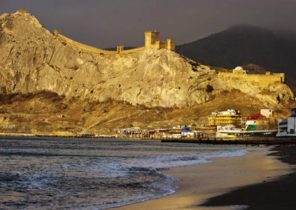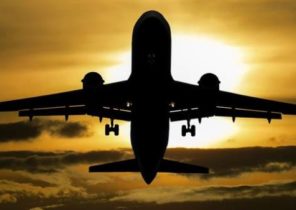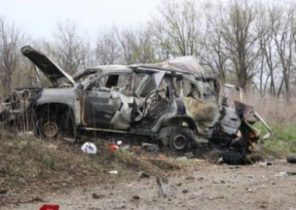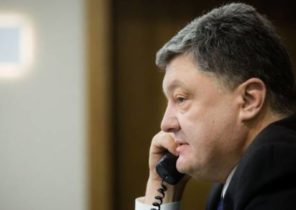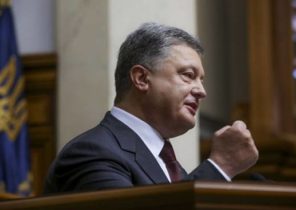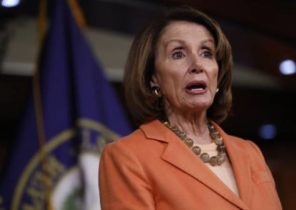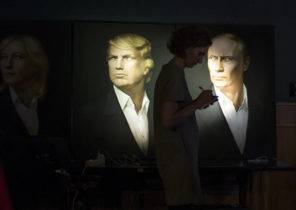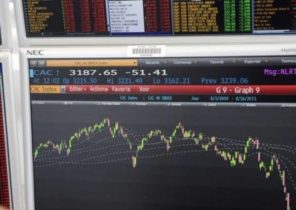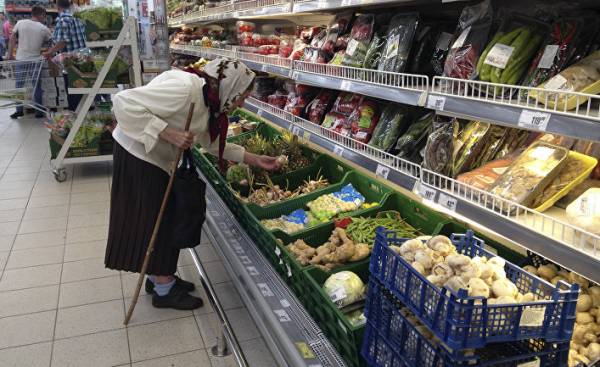
A year ago, 30-year-old Oksana came to Moscow from Siberia. She rents a room in a small, modest apartment in the village of Zhukovka, which is adjacent to the place where in their luxury cottages, home to many representatives of political and business elite of Russia.
“We see every day as they drive past whole convoys — it’s like they live in a completely different world,” says Oksana. She goes to work every day by car, and it is often necessary to deal with the fact that the police blocks the road so they could safely travel by government officials. “Before politics I almost didn’t care but now that I see how unfair this is, I often wondered whether it is time for us to change something”.
In recent years economists increasingly pay attention to the level of inequality in different countries, rather than simply to assess the level of poverty in absolute terms. Some economists believe that inequitable distribution of wealth is one of the key factors underpinning dissatisfaction with the actions of the political class and marginalized around the world.
At the world economic forum in Davos in January, the head of the International monetary Fund Christine Lagarde (Christine Lagarde) said that the growth in inequality was one of the factors responsible for the rise of populism all over the world. She added that she was warned about this four years ago, but now, after the election Donald trump President of the United States in connection with the growing popularity of far-right parties in Europe, people she hopes will pay more attention to her warnings.
A recent report by Credit Suisse says that Russia takes the first place among the largest world economies to levels of inequality. According to the report, 10% of the wealthiest Russians owned 87% of the wealth of the country — for comparison, in the US 10% of the wealthiest citizens owned 76% of the wealth, and in China — 66%. According to the Bank “VTB Capital”, 1% of the richest Russians own 46% of all personal Bank deposits in the country.
According to many Russians, such extreme inequality — one of the reasons is corruption — can cause “grumbling in the kitchen,” but unlikely to trigger serious political unrest. Meanwhile, in March in protests that were held all over Russia, was attended by approximately 60 thousand people from nearly 80 cities. Despite the fact that the percentage of these figures may seem insignificant, creates the impression that the people’s anger gradually begins to boil.
The results of the investigation of opposition leader Alexei Navalny has shown that the Prime Minister of Russia Dmitry Medvedev during the tenure of office managed to accumulate a collection of luxury estates, yachts and vineyards. The silence in response to the charges opposition charges contributed to the beginning of the protests. Later, Medvedev rejected the accusations, calling them ridiculous.
Navalny has announced his intention to take part in the presidential elections to be held next year, and now his campaign is based primarily on the fight against inequality: the opening of a regional campaign headquarters of Navalny in Chelyabinsk many slogans on the posters concerned the excessive wealth of the ruling elite. “Hospitals and roads, not the palaces of officials”, — was written on one of the posters. And in the first line of campaign leaflets it is stated: “a Decent life for all, not wealth for the 0.1%”.
Bulk charges in the address Medvedev became the next episode in a series of truly shocking revelations concerning the life of the representatives of the Russian government, which, as a rule, either ignored or denied. Navalny said that the wife of first Deputy Prime Minister Igor Shuvalov used a private plane to haul their dogs to the exhibition in Europe, and is a spacious and luxurious suburban estates — this is the norm for representatives of the top echelons of the government. Shuvalov refused to comment on allegations of Bulk. In addition, there are also businessmen-billionaires, who for the past two decades, spending fabulous sums on yachts, property abroad and parties.
According to Navalny, many Russians, who are forced to work for a tiny salary and watching a video of the luxurious palaces and yachts of government officials and government-affiliated oligarchs, all very angry. “Within a few years poverty existed only in the province but now it came to the big cities. Poverty is becoming a powerful engine of the protests, because people are beginning to think about it. You think about it, even if you live in Moscow and get a decent salary. And if you live in regional center and receives a salary of 15 thousand rubles a month (a little more than $ 200), it is quite another thing.”
A new class of billionaires
The current situation with inequality in Russia is placed in the context of the past 25 years of the history of Russia since the collapse of the Soviet Union, which gave impetus to the conduct of the privatization process in the 1990-ies.
Theoretically, the Soviet Union had become a state of universal equality. The Constitution of 1977 called for the “Erasure of class distinctions, significant differences between town and country, mental and physical labor, comprehensive development and convergence of all Nations and nationalities of the USSR”.
In the late 1970-ies, according to government statistics, only 0.2% of the Soviet citizens received more than four times the average salary. Of course, many then complained that the Soviet elite led a luxurious lifestyle than the majority of the population, and had access to luxury items and other goods that were not available for ordinary citizens, despite the fact that the difference in income was not so great.
However, the level of inequality that emerged in Russia in 1990-ies, was much more shocking. Capitalism was exactly how it was portrayed by the Soviet regime to a narrow circle of people got all staircases, and the vast majority of Russians went to be eaten by snakes. In the far North and East of the country where people went to work because the Soviet system pay them for big money, the market economy has rapidly destroyed many industrial cities, plunging into poverty entire regions.
In 2000, came to power Vladimir Putin, who has promised to unite the country and end the chaos of the 1990-ies. At the beginning of Putin’s first term salaries and pensions for the first time began to be paid regularly, although the wealthiest citizens continued to live a life unthinkable for most Russians. Later, a new class of billionaires, many of which are personally associated with the country’s President, but the promise of stability which the government generously distributed, continued to resonate among the population, frightened by the likelihood of coups.
In Russia also there is a widespread belief that all rulers are corrupt and thieves. When Oksana, enraged by the fact that roads are constantly overlapping for the sake of the elite on their luxury vehicles could travel without delay, complained to her mother-in-law in the palaces of the rich, she replied: “Putin is a superhero, and if he needs another Palace, I’ll give him my savings, he was able to build it”.
The revolutionary and the madman
35-year-old Yuri Bykov, premature graying and constantly looking tired, made two brilliant sad and sentimental film about life in the Russian regions.
He grew up in a remote village located near a large power station a few hours drive from Moscow, and now he makes films about the lack of connection between ordinary Russians and representatives of the political and financial elite. “No one is hungry fed, as they say here,” — he said.
Bulls fall hopes to start shooting new movie “Factory.” The plot revolves around an aging plant, which owner is the oligarch intends to close, because he had ceased to be profitable. Driven to despair and rage factory workers trick the owner to come and take him hostage. “This film is about what people can do, what he should do to change the situation. Where is the line between a revolutionary and a madman?”
According to Bykov, he would like to see the Russian rulers had to stop and think above the level of inequality in the country. He warns that if they do not, they have to deal with the inevitable consequences that are extremely painful for everyone.
However, despite extreme discontent Bykov levels of inequality in the country, he quite soberly assesses the potential of “the common man” and has no illusions about it. In his movie “Fool” tells the story of a plumber Dima Nikitin, who discovers a huge crack in the old Dorm, ready to collapse at any moment. The building is in such poor condition, because the mayor of the city for years put in his pocket the funds allocated for the repair of such buildings.
When he interrupts a lavish party local officials to inform them of the impending tragedy, they don’t want to listen to him. However, the residents of this hostel, where he comes to pick up people and bring all of the building that is about to collapse, see it as a threat of the attacker rather than the Savior. This film paints a rather bleak picture of the Russian mass consciousness.
“I don’t think the Russians are very concerned about inequality as such, says Bykov. — We are a feudal state, we have abolished serfdom only in 1861. People want to have a piece of bread and a roof over my head. They do not go out to protest until the situation will become truly catastrophic. But in this case, if they succeed, they will not engage in dialogue, they take the fork and go kill”.
The debate about inequality in Russia is very often reduced to arguments about the Russian soul and the complex history of Russia. Sophie Shevardnadze, granddaughter of the last foreign Minister of the Soviet Union and host of the talk show on one of Russian TV channels, agree that ordinary Russians rarely think about the difference in income and standard of living.
“I recently watched a documentary series about the Romanov dynasty, which focuses on how people have lived since the 1600’s. With the arrival of each new king the main problem was the corruption and bureaucracy, she says. — The national wealth was always distributed among the members of the nobility and never reached the masses.”
“The impression that all possible changes are purely cosmetic in nature, and, in a sense, Putin faced the same problem. The government machine, which stands between the President and the people are so bureaucratic and corrupt that it can no longer perform even the simplest requests of citizens. And because this system has always existed, the Russian people have put up with inequality and does not want to deal with it”.
The mentality of “them and us”
According to Navalny, stating that the Russian people are not able to come into a rage because of the inequality that is nonsense. Sustainable income growth, which was characteristic of the first presidential term of Putin, is gone after 2014, when the fall in oil prices and Western sanctions have dealt a severe blow to the Russian economy.
Approximately 23 million Russians — 16% of the population — officially live below the poverty line, and many of the signs indicates that the concentration of wealth in the hands of a tiny percentage of Russians is causing serious discontent among a growing number of ordinary citizens — especially given the fact that many rich people are either government officials or closely associated with them. According to recently published data, 41% of Russians of their incomes they are barely enough to buy food and clothing.
Today in Russia the mentality of “them and us”. During protests against the construction of new enterprises with high emissions, recently held in Chelyabinsk, a local activist Yuriy Cherkasov said from the stage: “If we don’t unite and not fight against this plant, after 10 years, our nature will be completely destroyed, and we are left here to choke on the mud, while they will transfer money to Cyprus and Panama”.
Sergei Shargunov, a 36-year-old MP and member of the Communist party faction in the Duma, recognizes that, “in the opinion of ordinary people, the world of politics and politicians is completely alien to them, and they have good reasons to think so”.
Shargunov is four Siberian district, and he claims that he is struggling to help their constituents to cope with their financial problems. He recently helped collect 700 thousand rubles for single mothers, which threatened to be evicted from the apartment because she was not able to pay the mortgage. He favours the introduction of a wealth tax and more progressive taxation.
“The popularity of the current government due to the fact that it represents the least of all evils, — said Shargunov. — People are not stupid, they understand everything, but after the experience of perestroika and the 1990-ies they are afraid that if you start a change, things could get worse. I hope the government will be able to establish a dialogue with the people, because revolution and rebellion does not need anyone”.
Meanwhile, Navalny said that popular protests are the only way to fight against inequality in Russia, and he did not agree that Russian people are inert and inclined to passivity. According to him, the poverty and anger against the rich may be very effective.
“People who come to us and support us as a rule are the most advanced representatives of the province, but when we ask them how much they earn, their answer is about 15-18 thousand rubles, — he said. They can live a normal life, and they don’t understand why they have to live in Russia of the XXI century. We are not talking about the fact that they have nothing to lose, but the realization that they have almost no prospects in life, makes people much bolder”.
